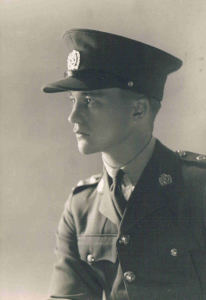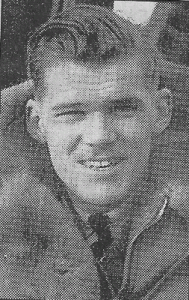So much potential lost
Any man’s death diminishes me because I am involved in mankind; And, therefore, never send to know for whom the bell tolls; It tolls for thee
-John Donne
His famous quotation reminds us that not only did war and the consequences of war cut short many lives, military and civilian, and deprived family; relatives and friends of loved ones, but it also deprived the communities and countries, and in the case of the most talented, all human kind, of people who could have made significant contributions to the good and well being of all. For most of the fallen their contributions would have been modest since that is the common lot. But there were a few with the opportunity and the talent to do something really important.
One who survived and had a distinguished post-war career was RCAF Sergeant Tom Miller. One who had like potential but did not survive was Major Edward G. Styffe of the Lake Superior Regiment (Motorized). He died in Normandy on Aug. 14, 1944 while serving as a company commander, and was recently memorialized in the village of Maizieres by having a street named after him.
Thomas Breach Miller (1921-1996) was the son of the manager of a CPR elevator in the Owen Sound district. Joining the RCAF Sergeant RCAF in 1940 he Tom Miller trained as a navigator and was assigned to No. 78 squadron of the RAF. He was shot down twice, first over England when, upon crashing, he pulled two of his comrades from the burning wreckage. Miller became the first Canadian to receive the George Medal, Britain’s second highest award for valour. A year later enemy action spilled him into the North Sea where he survived four long days in a dinghy before being picked up by the Germans and interned for duration.
Returning to Canada he utilized the generous Department of Veterans’ Affairs grants to take History at the University of Toronto, and subsequently earned a doctorate in that discipline from the University of London.
After graduation he joined Lakehead Technical Institute, an appointment which launched an Arts program leading to the transition to Lakehead University. Miller in his first year taught History; English, Political Science and Philosophy, apparently all effectively; and went on to become in many ways the godfather of Lakehead University where he served as professor of History and its first Extension director.
He was also active in many community endeavours especially in the areas of drama and music, and was an early member of the Lakehead Unitarian Fellowship. It is very difficult to imagine what Thunder Bay and particularly Lakehead University; would be like without his devotion and vision.
While Miller was a Lakeheader by adoption (he married a Fort William girl, and had his career in this city) Major Edward Styffe was a Lakeheader born and bred. He graduated from PACI and, but for the war, would probably have continued with the family firm in the timber industry.

Major E.G. Styffe
He joined the LSR in June 1940, went overseas with it, trained with it in England, joined the forces invading Europe in July 1944, and was killed in action on Aug.14.
Major Styffe was clearly seen by his regiment and by the army brass as a “commer”, someone to be prepared for a regimental command, or a staff position. When the Canadian army had the opportunity to send a few officers and NCOs to join the British First Army for three months in the invasion of Tunisia, Styffe was the LSR (M)’s choice.
What could have been expected of a man who showed such leadership and ability had he survived and return to civilian life? Based on the talent displayed in his army career he would probably have been a successful businessman either in the family firm or branching out on his own.
Another likelihood is that he would have joined that distinguished band of LSR (M) veterans headed by Lt. Col. J. E. V. Murrell and Major E. J. O. Gravelle which made such a signal contribution to this city in the post-war years including command of the local regiment. Almost every great and worthy enterprise in this era had their endorsement and support. In addition, Edward Styffe had ability in music, art and sports. He might well have brought trophies and awards back to Thunder Bay.
Possible, but less likely; was a political career. No post-war politician appeared to have played the veteran card with the vigor of “Fighting John” Manion a generation earlier which suggests that veteran status was not seen as a major political asset. Successful political careers in this period appear to have sprung from the Chamber of Commerce, and from the ethnic halls and parishes. Renaissance men like Tom Miller and Edward Styffe usually make their marks outside of politics.
Whatever the prospects, there can be no doubt that in addition to his army nurse-wife of four months, family and friends the Canadian Lakehead suffered a major loss with the death in action of Major E.G. Styffe, born during one war and died in the second. Reports indicate that the town was in shock on hearing that one of its most admired sons had died. His loss, and that of many other sons of the Lakehead emphasises the destructiveness and deadly after-effects of modern war where civilian losses now exceed those of the military.
Ask not for whom the bell tolls. The warning bell tolls for all of us, lest we forget.
Ken Morrison acknowledges having a most undistinguished military career which culminated in gaining an Artillery commission shortly before VE Day.
The Thunder Bay Chronicle Journal, Tuesday, November 11, 2003














